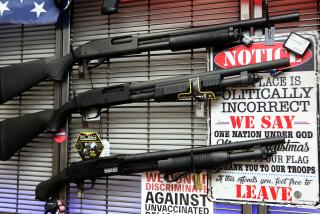Higher cigarette taxes: unhealthy and unfair
- Share via
Nicholas Goldberg’s “How and why taxes go up, in smoke” (June 14) reads more like press release from the anti-smoking lobby than an objective question-and-answer backgrounder: Smoking is bad and the state needs more money, therefore hiking the cigarette tax is good. If smokers quit, so much the better. It’s a win-win!
Oh, if life were only so simple.
Is smoking “bad”?
An overarching theme of the article is that smoking is simply a bad thing. Yet we live in a diverse society in which tastes vary widely. For some, total bliss is a pack of Marlboros and a day at the monster truck show; for others, it’s a bottle of Cabernet and a night at the opera. There is no reason one group should be subject to punitive taxes while the other is praised for its sophistication.
The fact that something is risky doesn’t make it bad. Some people ride motorcycles and sunbathe; like smoking, these are risky activities. Are they therefore bad? No. As long as people understand the risks of what they are doing and bear all of the costs, there is no reason for the government to threaten to impoverish them if they don’t live their lives in the way some bureaucrat demands.
Life in a free society requires tolerance of activities that have little or no effect on others, even those we don’t personally approve of. If government or interest groups have information about risks that are not widely known, they should disseminate it. Otherwise, adults should be left alone to live their lives in accordance with their own dreams and values.
Are cigarette taxes “good”?
Goldberg also points out that “smoking is unpopular, and smokers are politically weak,” so why not raise tobacco taxes? Is tyranny of the majority, the classic danger of democracy that Alexis de Tocqueville warned about, really something Californians want to embrace? Of course not. Instead, we should ask, what is an equitable division of the tax burden? Presumably we all benefit from government services. Then we should all pay for them.
A special tax on cigarettes could be justified if smokers were foisting some costs onto their fellow citizens. This subject has been studied extensively by some of the nation’s leading economists, who have found that there is indeed a small “externality” associated with smoking -- about 35 cents per pack. However, because federal and state cigarette taxes are far in excess of this amount, the current fiscal system transfers billions of dollars from relatively low-income smokers to higher-income nonsmokers. If anything, tax fairness calls for a reduction of the cigarette tax, certainly not a higher one.
Ancillary costs
Goldberg spends much of his time discussing how the law of demand -- the common-sense idea that as the price of something rises the quantity demanded by consumers falls -- can be used to snuff out smoking. Unfortunately, he glosses over another economic concept, the notion of a substitute good -- in this case, bootleg cigarettes -- that undermines his argument.
Right now, it is possible for bootleggers to earn more than $400,000 on every truckload of cigarettes smuggled into the Golden State. Those from a foreign source can fetch five times that amount. These illicit profits are the reason the California Board of Equalization estimates that the state loses more than $275 million annually to tobacco tax evasion.
It doesn’t take a Nobel laureate to know what would happen if the cigarette tax were doubled or tripled. The marked rise in bootlegging would mitigate any health benefits of the hike. Moreover, as commerce migrates from the corner store to the street corner, youth access to tobacco products would probably increase.
A higher tax would also probably trigger a wave of cigarette thefts, a problem that has plagued the state in the wake of past tax hikes. The increase in such lawlessness coupled with the rise in the crimes traditionally associated with black markets -- murders from deals gone bad, gun battles over turf and so on -- would adversely affect smokers and nonsmokers alike.
Conclusion
There are no easy answers to California’s budget woes. These problems have been building for decades. Perhaps it’s time for citizens to fundamentally reappraise exactly what they want the state government to do and devise a fair and efficient tax system for collecting revenue. Hiking what is already one of the most unfair and disruptive taxes on the books will only increase the harm to smokers and nonsmokers alike.
Patrick Fleenor is chief economist at the Tax Foundation.
More to Read
A cure for the common opinion
Get thought-provoking perspectives with our weekly newsletter.
You may occasionally receive promotional content from the Los Angeles Times.






